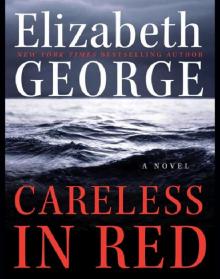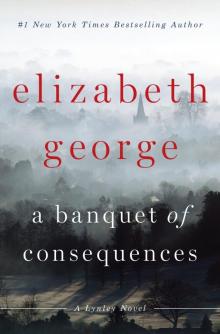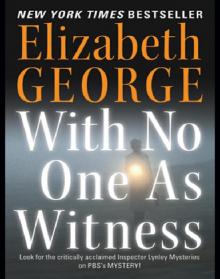- Home
- Elizabeth George
The Punishment She Deserves
The Punishment She Deserves Read online
Also by Elizabeth George
A Great Deliverance
Payment in Blood
Well-Schooled in Murder
A Suitable Vengeance
For the Sake of Elena
Missing Joseph
Playing for the Ashes
In the Presence of the Enemy
Deception on His Mind
In Pursuit of the Proper Sinner
A Traitor to Memory
I, Richard
A Place of Hiding
With No One as Witness
What Came Before He Shot Her
Careless in Red
This Body of Death
Believing the Lie
Just One Evil Act
A Banquet of Consequences
YOUNG ADULT
The Edge of Nowhere
The Edge of the Water
The Edge of the Shadows
The Edge of the Light
NONFICTION
Write Away:
One Novelist’s Approach to Fiction and the Writing Life
ANTHOLOGY
A Moment on the Edge: 100 Years of Crime Stories by Women
Two of the Deadliest: New Tales of Lust, Greed, and
Murder from Outstanding Women of Mystery
VIKING
An imprint of Penguin Random House LLC
375 Hudson Street
New York, New York 10014
penguin.com
Copyright © 2018 by Susan Elizabeth George
Penguin supports copyright. Copyright fuels creativity, encourages diverse voices, promotes free speech, and creates a vibrant culture. Thank you for buying an authorized edition of this book and for complying with copyright laws by not reproducing, scanning, or distributing any part of it in any form without permission. You are supporting writers and allowing Penguin to continue to publish books for every reader.
Here: Excerpts from “That Lives in Us,” by Rumi, and “The Moment’s Depth,” by Rabia are from Love Poems From God: Twelve Sacred Voices From the East and West, translated by Daniel Ladinsky. (New York: Penguin Compass, 2002.)
ISBN 9780525954347 (hardcover)
ISBN 9780698411654 (ebook)
This is a work of fiction. Names, characters, places, and incidents either are the product of the author’s imagination or are used fictitiously, and any resemblance to actual persons, living or dead, businesses, companies, events, or locales is entirely coincidental.
Version_1
FOR TOM, IRA, and FRANK
With thanks and love.
Somehow, I got lucky.
CONTENTS
Also by Elizabeth George
Title Page
Copyright
Dedication
Epigraph
Part I 15 DECEMBER
4 MAY
5 MAY
6 MAY
7 MAY
8 MAY
Part II 16 MAY
17 MAY
18 MAY
19 MAY
20 MAY
21 MAY
22 MAY
23 MAY
24 MAY
26 MAY
6 JULY
Acknowledgments
About the Author
Why lay yourself on the torturer’s rack
of the past and future?
The mind that tries to shape tomorrow beyond
its capacities will find no rest.
—RUMI
The moment’s depth is greater than that of the future.
And from the fields of the past,
what can you harvest again?
—RABIA OF BASRA
Part I
15 DECEMBER
BAKER CLOSE
LUDLOW
SHROPSHIRE
The snow began falling on Ludlow town in the evening, while most people were doing their post-dinner washing-up as a prelude to settling down in front of the television. If the truth be told, there wasn’t much else to do in the town after dark beyond tuning in to one programme or another or heading out to a pub. And since Ludlow had, over the years, become more and more the choice of pensioners seeking tranquility and early bedtimes amidst the mediaeval buildings and cobbled byways, very few complaints concerning the dearth of evening entertainment ever occurred.
Like so many others in Ludlow, Gaz Ruddock, too, was doing the washing-up when he first noticed the snow. He stood at a sink whose window looked out at the darkness. Mostly, he could see his reflection and the reflection of the old man who wielded the tea towel next to him. But a light in the narrow back garden illuminated the flakes as they began to come down. Within minutes what had seemed to be only a gentle dusting altered to a real curtain of the stuff, waving in a developing breeze that made it look for a moment like lace window coverings.
“Don’t like that, do I? I keep saying. Fat lot of good it’s doing me, though.”
Gaz glanced over at his companion of the tea towel. He didn’t think the old bloke was talking about the snow, and he saw that he was correct since Robert Simmons wasn’t looking at the window but rather at the washing-up wand that Gaz was using on one of their plates.
“In’t sanitary, that,” old Rob said. “I keep saying and you don’t change over like I want.”
Gaz smiled, not at old Rob—he always thought of his housemate with that adjective preceding his name as if there were also a young Rob in the house with them—but rather at his own reflection. He and window Gaz were sharing a knowing look. Rob nightly complained about the wand, and Gaz nightly reminded him that it was far more sanitary than filling a basin with soapy water in order to swirl glasses, crockery, cutlery, pots, and pans round it as if the water miraculously redeemed itself after every dunk of something into it.
“Only thing better than this,” Gaz would say, with a shake of the washing-up wand, “is a dishwasher. You say the word and I’ll fetch us one, Rob. Easy as anything. I’ll even install it.”
“Bah,” Rob would reply. “Got along till eighty-six years and counting without such a thing and I expect I can make it to the grave without one just as well. Mod cons, bah!”
“You’ve a microwave, mind,” Gaz would point out.
“Different, that is,” was the curt reply.
If Gaz asked why possession of a microwave was different from the purchase of a dishwasher, Rob’s answer was always the same: a huff, a shrug, and a “Just is, is all,” and the discussion was finished.
It mattered little to Gaz. He wasn’t much of a cook so there was never very much to wash. Tonight the meal had been jacket potatoes stuffed with chilli con carne from a tin, with a sweet corn and lettuce salad on the side. Half of the meal had been prepared via microwave and the tin hadn’t even required an opener, possessing a pull ring instead. So all there was to wash was two plates, one wooden spoon, some cutlery, and two mugs from which they’d drunk their tea.
Gaz could have done the washing-up and the drying on his own, but old Rob liked to help. The old gent knew that his only child, Abigail, phoned Gaz once a week for a report as to her dad’s well-being, and Rob intended Gaz to declare that his charge was just as full of piss and vinegar as on the day he’d moved in. Even if Abigail’s phone call hadn’t been a regular feature of their life together, Gaz suspected old Rob would still have insisted on doing his part, though. It was the only way he’d agreed to admit s
omeone into his house in the first place.
Once his wife had died, he’d gone on living on his own for six years, but his daughter thought he was becoming too forgetful. There was his medication that wanted taking twice each day. There was also the concern that if he fell, there’d be no one in the house to find him. Abigail needed someone to be in charge of her dad, she had declared, and faced with the choice of sharing his home with a carefully selected stranger or leaving Ludlow for a life with Abigail, her four children, and a husband whom her dad had disliked from the day he appeared on the doorstep to take his only daughter clubbing in Shrewsbury, Rob had pounced on the idea of a housemate like the lifebelt it was.
Gaz Ruddock—given name Gary—was that housemate. He had another job as Ludlow’s PCSO, but that was mostly during the day and since he generally walked or bicycled his beat like a 1920s bobby, he could stop in and check on the old gent daytimes when necessary. It worked a perfect trick for him anyway: his wages as the police community support officer were meagre, and acting as Rob’s live-in companion gave him not only free accommodation but a small salary as well.
His mobile rang as Gaz was wiping down the draining board and Rob was neatly folding the tea towel onto the rack above the cooker, where it would dry. Gaz shot the mobile a glance to see who was phoning. He gave thought to ignoring the call as old Rob gave him the eye. They’d lived together long enough for Rob to know what would happen next. A phone call in the evening usually meant a disruption to their plans.
“Near time for Strictly Dancing,” Rob reminded him, naming the programme he favoured above all others. “An’ Sky has a Clint Eastwood film as well. The one with that barmy woman.”
“Aren’t they all barmy?” Gaz decided to let the mobile go to message. He needed to get Rob settled with the telly and the remote.
“Not like this one,” the old man said. “This’s the gel who wants that radio song played for her. You know. Then she ’cides that Clint Eastwood must be her man—maybe they do the job on each other or somethin’ but I don’t recall ’cept men are that foolish when it comes to women, eh?—and she commences to break into his house and chop up his belongings.”
“Play Misty for Me,” Gaz said.
“You recollect it, then?”
“Oh, that I do. It put me off women altogether, that film.”
Old Rob laughed, which segued into a cough that didn’t sound all that good to Gaz. Rob had been a smoker till he was seventy-four, when a quadruple bypass had finally convinced him to give up the weed. But that didn’t mean that the sixty years of smoking preceding the bypass hadn’t done enough damage to fell him with cancer or emphysema.
Gaz said to him, “You all right there, Rob?”
“’Course I am. Why wouldn’t I be?” Rob gifted him with a glare.
“No reason, ’f course,” Gaz told him. “Let’s get you settled with the telly, then. Need the loo first?”
“What’re you on about? I know when I have to piss, boy.”
“Not suggesting you don’t.”
“Well, when I need someone to shake off my—”
“Point taken.” Gaz followed the old gent to the sitting room at the front of the house. He didn’t much like the tilt to Rob’s gait or the hand he put on the wall to steady himself. He needed to use a walking stick, he did, but the bloke was a stubborn bastard. If he didn’t want a walking stick, he was going to be Gibraltar when it came to anyone’s recommendation that he use one.
Once in the sitting room, old Rob lowered himself into his armchair. Gaz lit the electric fire and closed the window curtains. He excavated for the telly remote, and he found the right channel for Strictly Come Dancing. Five minutes before the programme would begin, he saw, enough time for him to make the Ovaltine.
He found Rob’s nighttime mug in its place in the cupboard, decorated with a transfer picture of his grandkids gathered round Father Christmas. This had faded with subsequent washings, and the ivy-and-holly wreath that formed the handle of the mug was chipped. But Rob wouldn’t hear of having his Ovaltine from anything other than this particular mug. He made a big thing out of muttering complaints about the grandkids, but Gaz had learned soon enough that old Rob properly adored them.
Ovaltine in hand, Gaz returned to the sitting room. His mobile began to ring again. Again he ignored it in favour of getting old Rob settled. Strictly Come Dancing had just begun, and its opening moments were the special ones.
Rob loved to gaze upon the ladies, those who were contestants and those who were the professional dancers meant to teach the bloke contestants the cha-cha, the fox-trot, the Vienna thingy, and whatever else. Old Rob ate up the costumes with a spoon because they were fashioned to display a good mile and a half of cleavage and the sight of those ladies shaking their tits was a blessed reminder that, at eighty-six and counting, Robert Simmons was still alive.
“Lookit them, will you, lad?” Old Rob sighed. He held his Ovaltine up in a salute to the television screen. “You ever seen milkers ’s pretty as those? ’F I was even ten years younger, I’d show those ladies how milkers like that are meant to be used and wouldn’t I just?”
Gaz chuckled, but it was in spite of himself, as where he came from women were worshipped, up on the pedestal and all of that. They were sexual, sure. But they were sexual because of God’s plan for them, and that plan didn’t include making themselves available to men for purposes of displaying their “milkers,” especially on telly. But there was no changing old Rob, who was a randy bloke, and Strictly Come Dancing was the highlight of his week.
Gaz fetched a blanket from the back of the sofa. He tucked it round Rob’s sapling legs. He checked the Radio Times to make sure Play Misty for Me was actually showing later on in the evening, and when he saw it was, he left his companion chortling at the inane conversation going on between the presenter and the judges on the dancing programme.
He’d left his mobile in the kitchen, and he took it to the table, where he flopped into a chair. He had an uneasy feeling about the call. It was end of autumn term at West Mercia College. With exams finished and students readying themselves for the Christmas holiday, loud parties and binge drinking were probably going to be on the night’s agenda.
He tapped on the mobile to return the call. Clo answered at once and said to him, “We’ve snow here, Gaz. What about you?”
Gaz knew that she wasn’t interested in a report on the topic of the weather, but it was a way to begin a conversation that, he also knew, was going to progress towards a request that Clo knew she probably shouldn’t give voice to. He wasn’t going to make it easy for her. He said, “Here, too. It’ll make a dog’s dinner of the roads, to be sure, but at least it’ll keep everyone inside.”
“End of term, Gaz. Kids won’t be inside. They don’t care about snow, sleet, rain, or whatever when it comes to the end of term.”
“They’re not delivering the post,” he pointed out.
“What?”
“Snow, sleet, rain. Postmen?”
“Believe me, they may as well be postmen. The weather isn’t going to stop them.”
He waited, then, for what was coming. It took her only a moment.
“Would you check on him, Gaz? You can make it part of a regular round. You’ll be doing a round anyway, won’t you? Considering the weather, I expect you’re not the only PCSO being asked to go out tonight to check on young people in the pubs.”
Gaz rather doubted that. West Mercia was the only college in all of Shropshire, and it was hardly credible that the rest of the PCSOs in the other communities were going walkabout in the snow with no reason for doing so. But he didn’t argue the point. He cared for Clo. He cared for her family. Although he knew she was playing on those feelings, he could easily go along with her request.
Still, he said, “Trev’s not going to like it if I do this. I expect you know that, eh?”
“Trev�
��s not going to learn about it because you’re not going to tell him. And I’m certainly not going to.”
“It’s not me you should be worrying about when it comes to grassing, though, is it.”
There was a pause as she took this in. He could visualise her. If she was still working for some reason, she’d be sitting at a desk, which would be perfectly neat and orderly in the way she was neat and orderly. If she was at home, she’d be in the bedroom, kitted out in something that she deemed wife-appropriate, and this would be for her husband’s benefit. She’d told him more than once in joking that Trev liked her soft, sweet, and compliant, all characteristics that weren’t exactly natural to her.
She said, “As I said, end of term, streets getting icy, kids engaged in post-exam booze-ups . . . No one is going to question why you’re out and about, making sure everyone’s safe, Finnegan included.”
That wasn’t unreasonable. Besides, being out and about did have benefits beyond mere exposure to bracing air. He said, “All right. Will do. But it only makes sense if I’m out there later on. Just now? No one’s going to be up to anything.”
“Understood,” she said. “Thank you, Gaz. You’ll let me know what he’s up to?”
“’Course,” he told her.
ST. JULIAN’S WELL
LUDLOW
SHROPSHIRE
Missa Lomax gazed upon the clothing that her friend Dena—commonly called Ding—had laid out on the bed. Three skirts, one cashmere pullover, two silk blouses, a pullover top hung with silver dangly bits akin to icicles. She’d removed all this from a capacious rucksack, saying, “The black one’s the best, Missa. It’s real stretchy.”
Stretchy was necessary. The clothing all belonged to Ding, and she and Missa did not share a similar physique. Where Ding was petite and curvy, possessing a woman’s full body but not much height, Missa was pear-shaped, given to hips if she wasn’t careful about her weight, and she stood six inches taller than her friend. But she had brought nothing with her to Ludlow that would serve as a festive outfit for a night out. She’d not even considered nights out when she’d joined the college because she’d not come to Ludlow to party but rather to study biology, chemistry, maths, and French prior to attending university.

 Well-Schooled in Murder
Well-Schooled in Murder Just One Evil Act
Just One Evil Act This Body of Death
This Body of Death The Edge of the Water
The Edge of the Water For the Sake of Elena
For the Sake of Elena Believing the Lie
Believing the Lie The Edge of the Shadows
The Edge of the Shadows Just One Evil Act: A Lynley Novel
Just One Evil Act: A Lynley Novel In Pursuit of the Proper Sinner
In Pursuit of the Proper Sinner A Moment on the Edge:100 Years of Crime Stories by women
A Moment on the Edge:100 Years of Crime Stories by women Elizabeth I
Elizabeth I I, Richard
I, Richard A Traitor to Memory
A Traitor to Memory Missing Joseph
Missing Joseph A Suitable Vengeance
A Suitable Vengeance Careless in Red
Careless in Red A Banquet of Consequences
A Banquet of Consequences Playing for the Ashes
Playing for the Ashes With No One As Witness
With No One As Witness Deception on His Mind
Deception on His Mind The Best American Mystery Stories 2016
The Best American Mystery Stories 2016 A Great Deliverance
A Great Deliverance In the Presence of the Enemy
In the Presence of the Enemy Believing the Lie il-17
Believing the Lie il-17 The Edge of the Light
The Edge of the Light SW01 - The Edge of Nowhere
SW01 - The Edge of Nowhere A Place of Hiding
A Place of Hiding What Came Before He Shot Her il-14
What Came Before He Shot Her il-14 Payment In Blood
Payment In Blood The Punishment She Deserves
The Punishment She Deserves This Body of Death: An Inspector Lynley Novel
This Body of Death: An Inspector Lynley Novel Just One Evil Act il-18
Just One Evil Act il-18 What Came Before He Shot Her
What Came Before He Shot Her Missing Joseph il-6
Missing Joseph il-6